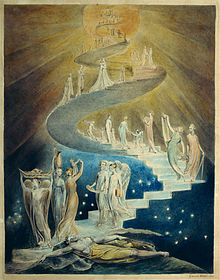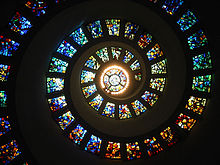Meister Eckhart
Appearance

Meister Eckhart (c. 1260 – 1328) was a German Monist philosopher, mystic, and theologian of the Catholic Church.
Quotes
[edit]


- Truth is something so noble that if God could turn aside from it, I could keep the truth and let God go.
- Meister Eckhart: A Modern Translation (1941) by Raymond Bernard Blakney, p. 240
- The most powerful prayer, one wellnigh omnipotent, and the worthiest work of all is the outcome of a quiet mind. The quieter it is the more powerful, the worthier, the deeper, the more telling and more perfect the prayer is. To the quiet mind all things are possible. What is a quiet mind? A quiet mind is one which nothing weighs on, nothing worries, which, free from ties and from all self-seeking, is wholly merged into the will of God and dead to its own.
- As translated in A Dazzling Darkness: An Anthology of Western Mysticism (1985) by Patrick Grant
- God wants nothing of you but the gift of a peaceful heart.
- As translated in The Enlightened Mind: An Anthology of Sacred Prose (1991) edited by Stephen Mitchell, p. 115
- Unmovable disinterest brings man into likeness of God. ... To be full of things is to be empty of God; to be empty of things is to be full of God.
- As quoted in Men Who Have Walked with God (1992) by Sheldon Cheney, p. 198
- We are all meant to be mothers of God, for God is always needing to be born.
- As quoted in Christianity (1995) by Joe Jenkins, p. 27
- When God has sent his angel to me, then I know of a surety. ... When God sends his angel to the soul it becomes the one who knows for sure. Not for nothing did God give the keys into St. Peter's keeping, for Peter stands for knowledge, and knowledge is the key that unlocks the door, presses forward and breaks in, to discover God as he is.
- Sermon 9, as translated in The Reading and Preaching of the Scriptures in the Worship of the Christian Church (1999) by Hughes Oliphant Old, Ch. 9: The German Mystics, p. 448
- The authorities teach that next to the first emanation, which is the Son coming out of the Father, the angels are most like God. And it may well be true, for the soul at its highest is formed like God, but an angel gives a closer idea of Him. That is all an angel is: an idea of God. For this reason the angel was sent to the soul, so that the soul might be re-formed by it, to be the divine idea by which it was first conceived. Knowledge comes through likeness. And so because the soul may know everything, it is never at rest until it comes to the original idea, in which all things are one. And there it comes to rest in God.
- Sermon 9, as translated in The Reading and Preaching of the Scriptures in the Worship of the Christian Church (1999) by Hughes Oliphant Old, Ch. 9: The German Mystics, p. 449
- We shall find God in everything alike, and find God always alike in everything.
- Quoted in Geary's Guide to the World's Great Aphorists (2007) by James Geary, p. 232
- Only those who have dared to let go can dare to reenter.
- Quoted in Geary's Guide to the World's Great Aphorists (2007) by James Geary, p. 232
- Gott kann uns ebensowenig entbehren wie wir ihn.
- God can dispense with us just as little as we can dispense with him.
- Sermon 49
- God can dispense with us just as little as we can dispense with him.
- Der Mensch soll sich nicht genügen lassen an einem gedachten Gott; denn wenn der Gedanke vergeht, so vergeht auch der Gott.
- A person should never be satisfied with a thought God, for when the thought perishes, the God also perishes.
- Deutsche Predigten und Traktate (1963), p. 60
- A person should never be satisfied with a thought God, for when the thought perishes, the God also perishes.
- The more God is in all things, the more He is outside them. The more He is within, the more without.
- Quoted by Aldous Huxley, in The Perennial Philosophy (1945)
Meister Eckhart’s Sermons (1909)
[edit]
- Meister Eckhart’s Sermons, translated into English by Claud Field (1909)







- Now the Father draws us from the evil of sin to the goodness of His grace with the might of His measureless power, and He needs all the resources of His strength in order to convert sinners, more than when He was about to make heaven and earth, which He made with His own power without help from any creature. But when He is about to convert a sinner, He always needs the sinner's help. "He converts thee not without thy help," as St. Augustine says.
- Sermon I : The Attractive Power of God
- A man may go into the field and say his prayer and be aware of God, or, he may be in Church and be aware of God; but, if he is more aware of Him because he is in a quiet place, that is his own deficiency and not due to God, Who is alike present in all things and places, and is willing to give Himself everywhere so far as lies in Him. He knows God rightly who knows Him everywhere.
- Sermon II : The Nearness of the Kingdom
- When man humbles himself, God cannot restrain His mercy; He must come down and pour His grace into the humble man, and He gives Himself most of all, and all at once, to the least of all. It is essential to God to give, for His essence is His goodness and His goodness is His love. Love is the root of all joy and sorrow. Slavish fear of God is to be put away. The right fear is the fear of losing God. If the earth flee downward from heaven, it finds heaven beneath it; if it flee upward, it comes again to heaven. The earth cannot flee from heaven: whether it flee up or down, the heaven rains its influence upon it, and stamps its impress upon it, and makes it fruitful, whether it be willing or not. Thus doth God with men: whoever thinketh to escape Him, flies into His bosom, for every corner is open to Him. God brings forth His Son in thee, whether thou likest it or not, whether thou sleepest or wakest; God worketh His own will. That man is unaware of it, is man's fault, for his taste is so spoilt by feeding on earthly things that he cannot relish God's love. If we had love to God, we should relish God, and all His works; we should receive all things from God, and work the same works as He worketh.
- Sermon III : The Angel's Greeting
- The everlasting and paternal wisdom saith, "Whoso heareth Me is not ashamed." If he is ashamed of anything he is ashamed of being ashamed. Whoso worketh in Me sineth not. Whoso confesseth Me and feareth Me, shall have eternal life. Whoso will hear the wisdom of the Father must dwell deep, and abide at home, and be at unity with himself.
- Sermon IV : True Hearing
- All that the Eternal Father teaches and reveals is His being, His nature, and His Godhead, which He manifests to us in His Son, and teaches us that we are also His Son.
- Sermon IV : True Hearing
- A question arises regarding the angels who dwell with us, serve us and protect us, whether their joys are equal to those of the angels in heaven, or whether they are diminished by the fact that they protect and serve us. No, they are certainly not; for the work of the angels is the will of God, and the will of God is the work of the angels; their service to us does not hinder their joy nor their working. If God told an angel to go to a tree and pluck caterpillars off it, the angel would be quite ready to do so, and it would be his happiness, if it were the will of God.
- Sermon IV : True Hearing
- The man who abides in the will of God wills nothing else than what God is, and what He wills. If he were ill he would not wish to be well. If he really abides in God's will, all pain is to him a joy, all complication, simple: yea, even the pains of hell would be a joy to him. He is free and gone out from himself, and from all that he receives, he must be free. If my eye is to discern colour, it must itself be free from all colour. The eye with which I see God is the same with which God sees me. My eye and God's eye is one eye, and one sight, and one knowledge, and one love.
- Sermon IV : True Hearing
- We read in the Gospels that Our Lord fed many people with five loaves and two fishes. Speaking parabolically, we may say that the first loaf was — that we should know ourselves, what we have been everlastingly to God, and what we now are to Him. The second — that we should pity our fellow Christian who is blinded; his loss should grieve us as much as our own. The third — that we should know our Lord Jesus Christ's life, and follow it to the utmost of our capacity. The fourth — that we should know the judgments of God. ... The fifth is — that we should know the Godhead which has flowed into the Father and filled Him with joy, and which has flowed into the Son and filled Him with wisdom, and the Two are essentially one.
- Sermon V : The Self-Communication of God
- Now rejoice, all ye powers of my soul, that you are so united with God that no one may separate you from Him. I cannot fully praise nor love Him therefore must I die, and cast myself into the divine void, till I rise from non-existence to existence.
- Sermon V : The Self-Communication of God
- The Father and the Son have one Will, and that Will is the Holy Ghost, Who gives Himself to the soul so that the Divine Nature permeates the powers of the soul so that it can only do God-like works.
- Sermon V : The Self-Communication of God
- Sanctification is the best of all things, for it cleanses the soul, and illuminates the conscience, and kindles the heart, and wakens the spirit, and girds up the loins, and glorifies virtue and separates us from creatures, and unites us with God. The quickest means to bring us to perfection is suffering; none enjoy everlasting blessedness more than those who share with Christ the bitterest pangs. Nothing is sharper than suffering, nothing is sweeter than to have suffered. The surest foundation in which this perfection may rest is humility; whatever here crawls in the deepest abjectness, that the Spirit lifts to the very heights of God, for love brings suffering and suffering brings love.
- Sermon VI : Sanctification
- Grace is from God, and works in the depth of the soul whose powers it employs. It is a light which issues forth to do service under the guidance of the Spirit. The Divine Light permeates the soul, and lifts it above the turmoil of temporal things to rest in God. The soul cannot progress except with the light which God has given it as a nuptial gift; love works the likeness of God into the soul. The peace, freedom and blessedness of all souls consist in their abiding in God's will. Towards this union with God for which it is created the soul strives perpetually.
- Sermon VII : Outward and Inward Morality
- All true morality, inward and outward, is comprehended in love, for love is the foundation of all the commandments.
All outward morality must be built upon this basis, not on self-interest. As long as man loves something else than God, or outside God, he is not free, because he has not love. Therefore there is no inner freedom which does not manifest itself in works of love. True freedom is the government of nature in and outside man through God; freedom is essential existence unaffected by creatures. But love often begins with fear; fear is the approach to love: fear is like the awl which draws the shoemaker's thread through the leather.- Sermon VII : Outward and Inward Morality
- The inner work is first of all the work of God's grace in the depth of the soul which subsequently distributes itself among the faculties of the soul, in that of Reason appearing as Belief, in that of Will as Love, and in that of Desire as Hope. When the Divine Light penetrates the soul, it is united with God as light with light. This is the light of faith. Faith bears the soul to heights unreachable by her natural senses and faculties.
- Sermon VII : Outward and Inward Morality
- As the peculiar faculty of the eye is to see form and colour, and of the ear to hear sweet tones and voices, so is aspiration peculiar to the soul. To relax from ceaseless aspiration is sin. This energy of aspiration directed to and grasping God, as far as is possible for the creature, is called Hope, which is also a divine virtue. Through this faculty the soul acquires such great confidence that she deems nothing in the Divine Nature beyond her reach.
- Sermon VII : Outward and Inward Morality
- As God can only be seen by His own light, so He can only be loved by His own love.
- Sermon VII : Outward and Inward Morality
- The moral task of man is a process of spiritualization. All creatures are go-betweens, and we are placed in time that by diligence in spiritual business we may grow liker and nearer to God. The aim of man is beyond the temporal — in the serene region of the everlasting Present.
- Sermon VII : Outward and Inward Morality
- This passage from nothingness to real being, this quitting of oneself is a birth accompanied by pain, for by it natural love is excluded. All grief except grief for sin comes from love of the world. In God is neither sorrow, nor grief, nor trouble. Wouldst thou be free from all grief and trouble, abide and walk in God, and to God alone. As long as love of the creature is in us, pain cannot cease.
- Sermon VII : Outward and Inward Morality
- Through the higher love the whole life of man is to be elevated from temporal selfishness to the spring of all love, to God: man will again be master over nature by abiding in God and lifting her up to God.
- Sermon VII : Outward and Inward Morality
Disputed
[edit]
- If the only prayer you said in your whole life was, "Thank You," that would suffice.
- Variant: If "thank you" is the only prayer you can utter in your lifetime, that would be enough.
- Very commonly attributed to Eckhart on the internet and some publications, the source of the first formulation however is: A Bucket of Surprises (2002) by J. John and Mark Stibbe.
- However a quote very similar to this one can actually be found in his works. In Sermon XXVII (Walshe translation/in Quint Sermon XXXIV) we can read:
- If a man had no more to do with God than to be thankful, that would suffice.
- Middle High German: Haete der mensche niht me ze tuonne mit gote, dan daz er dankbaere ist, ez waere genuoc.
- And suddenly you know: It's time to start something new and trust the magic of beginnings.
- Widely circulated on the internet, but no actual text to tie it back to Eckhart, as of yet.
- The knower and the known are one.
- Widely circulated on the Internet, but no actual text to tie it back to Eckhart.
- The knower and the known are one. Simple people imagine that they should see God as if he stood there and they here. This is not so. God and I, we are one in knowledge.
- Circulated on the Internet, this is an amended version of a quote from Eckhart's sermon iusti vivent in aeternum: There are simple people who imagine they are going to see God as if He were standing here and they there. This is not true. God and I are one.
- Middle High German: “Sumlîche einveltige liute wænent, sie süln got sehen, als er dâ stande und sie hie. Des enist niht. Got und ich wir sîn ein.”
Quotes about Eckhart
[edit]

- Meister Eckhart, who has been called the “Father of German thought”, was a Dominican monk, and one of the most profound thinkers of the Middle Ages. ... The importance of Eckhart in the history of scholastic philosophy is considerable. At that period all the efforts of religious philosophy were directed to widen theology, and to effect a reconciliation between reason and faith. The fundamental idea of Eckhart's philosophy is that of the Absolute or Abstract Unity conceived as the sole real existence. His God is the θεο αγνωστο [Theo Agnosto (Unknown God)] of the neoplatonists: He is absolutely devoid of attributes which would be a limitation of His Infinity. God is incomprehensible; in fact, with regard to our limited intelligence, God is the origin and final end of every being.
- Claud Field, in the Preface to Sermons (1909)
- The attempt to prove Eckhart a mere scholastic is a failure; the audacities of his German discourses cannot be explained as an accommodation to the tastes of a peculiar audience. For good or evil Eckhart is an original and independent thinker, whose theology is confined by no trammels of authority.
- The Godhead, according to Eckhart, is the universal and eternal Unity comprehending and transcending all diversity. "The Divine nature is Rest," he says in one of the German discourses; and in the Latin fragments we find: "God rests in Himself, and makes all things rest in Him." The three Persons of the Trinity, however, are not mere modes or accidents, but represent a real distinction within the Godhead. God is unchangeable, and at the same time an "everlasting process." The creatures are "absolutely nothing"; but at the same time "God without them would not be God," for God is love, and must objectify Himself; He is goodness, and must impart Himself. As the picture in the mind of the painter, as the poem in the mind of the poet, so was all creation in the mind of God from all eternity, in uncreated simplicity. The ideal world was not created in time; "the Father spake Himself and all the creatures in His Son"; "they exist in the eternal Now" —"a becoming without a becoming, change without change." "The Word of God the Father it the substance of all that exists, the life of all that lives, the principle and cause of life." Of creation he says : "We must not falsely imagine that God stood waiting for something to happen, that He might create the world. For so soon as He was God, so soon as He begat His coeternal and coequal Son, He created the world."
- William Ralph Inge, in Light, Life, and Love: Selections from the German Mystics of the Middle Ages (1904), p. xx
- Eckhart recognises that it is a harder and a nobler task to preserve detachment in a crowd than in a cell; the little daily sacrifices of family life are often a greater trial than selfimposed mortifications. "We need not destroy any little good in ourselves for the sake of a better, but we should strive to grasp every truth in its highest meaning, for no one good contradicts another." "Love God, and do as you like, say the Free Spirits. Yes; but as long as you like anything contrary to God's will, you do not love Him."
There is much more of the same kind in Eckhart's sermons — as good and sensible doctrine as one could find anywhere.- William Ralph Inge, in Light, Life, and Love: Selections from the German Mystics of the Middle Ages (1904), p. xxx; Inge quotes Eckhart quoting or paraphrasing Augustine of Hippo: "Love, and do as you will."
- The influence of Meister Eckhart is stronger today than it has been in hundreds of years. Eckhart met the problems of contingency and omnipotence, creator-and-creature-from-nothing by making God the only reality and the presence or imprint of God upon nothing, the source of reality in the creature. Reality in other words was a hierarchically structured participation of the creature in the creator. From the point of view of the creature this process could be reversed. If creatureliness is real, God becomes the Divine Nothing. God is not, as in scholasticism, the final subject of all predicates. He is being as unpredicable. The existence of the creature, in so far as it exists, is the existence of God, and the creature's experience of God is therefore in the final analysis equally unpredicable. Neither can even be described; both can only be indicated. We can only point at reality, our own or God's. The soul comes to the realization of God by knowledge, not as in the older Christian mysticism by love. Love is the garment of knowledge. The soul first trains itself by systematic unknowing until at last it confronts the only reality, the only knowledge, God manifest in itself. The soul can say nothing about this experience in the sense of defining it. It can only reveal it to others.
- Kenneth Rexroth, in "Eckhart, Brethren of the Free Spirit," from Communalism: From Its Origins to the Twentieth Century (1974), ch. 4
- I think of the marvellous history of Rheno-Flemish mysticism of the thirteenth and especially of the fourteenth centuries... Did not Eckhart teach his disciples: “All that God asks you most pressingly is to go out of yourself … and let God be God in you” [cf Walshe Sermon 13b]? One could think that in separating himself from creatures the mystic leaves his brother humanity behind. The same Eckhart affirms that on the contrary the mystic is marvelously present to them on the only level where he can truly reach them, that is, in God.
- Pope Saint John Paul II, Speech (in French) to participants in the Convention on Adrienne von Speyr (September 28, 1985)


